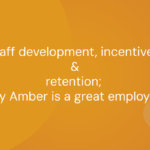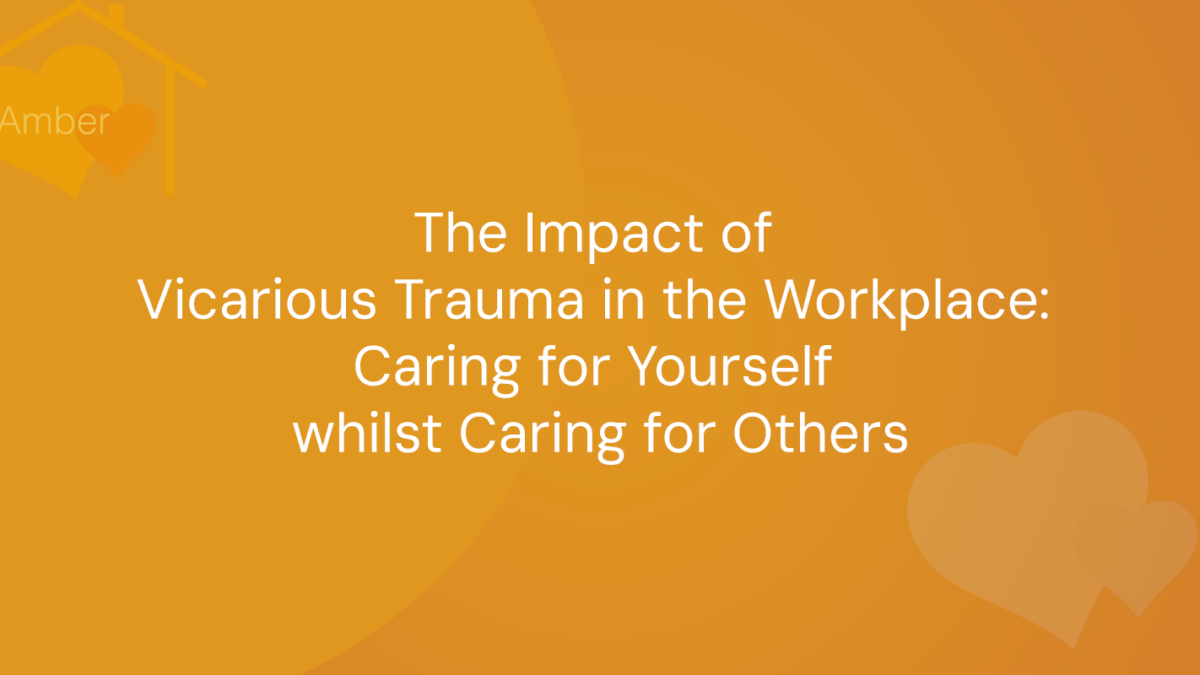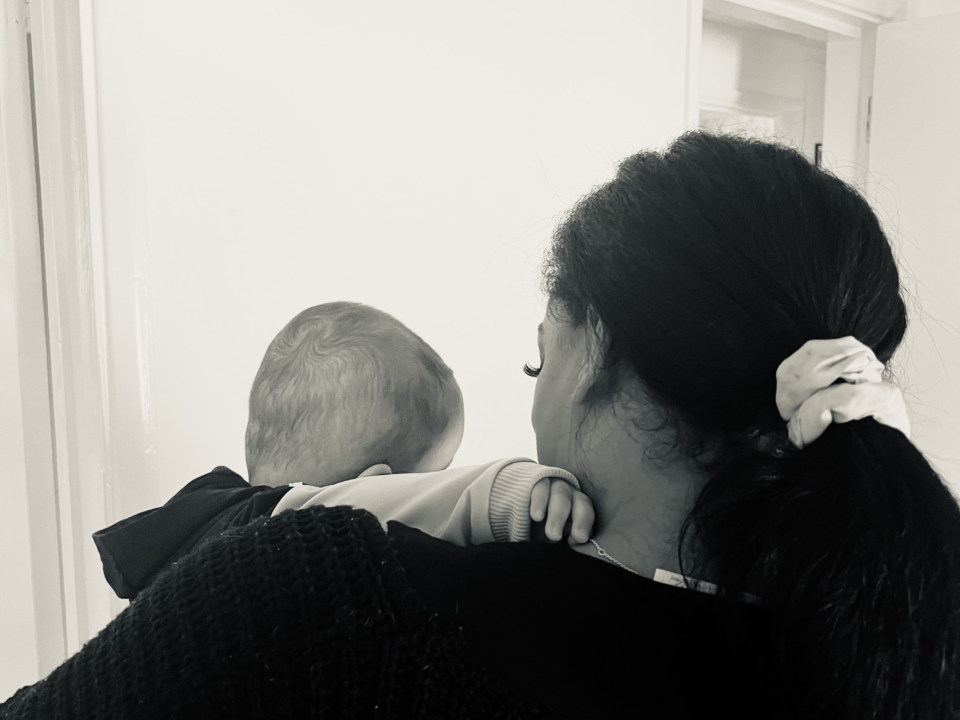
Staff development, incentives and retention; why Amber is a great employer.
01/04/2022
Restorative Practice: Why We Use it within Amber Family.
02/08/2022Coral McCormick. June 2022.
Regularly being exposed to crisis and hardship, is bound to take its toll on anyone, regardless of the job you’re in. Many of us working on the frontline, in this case, the care sector, are exposed to some level of trauma on a daily basis. We will witness first-hand, individuals struggling with adverse childhood experiences, intimate partner violence, addiction, loss of a child/parent, homelessness and death, to name just a few. It stands to reason that dealing with these issues over a prolonged period of time will affect any individual on a personal level; eventually, this will impact the organisation itself. Whilst working within the care sector can be, and very often is, very rewarding, we also have to contend with emotional challenges in the workplace, which include vicarious trauma.
“Vicarious Trauma”, is a term most often used by psychologists to describe the changes an individual can experience as a result of working with traumatic experiences, both in the short and long term. In simple terms, it is a way of acknowledging that challenging workplace factors, such as exposure to trauma or adversity, can negatively impact the emotional well-being of the employee. If you spend your working day taking care of other people, you may be taking on their stress, experiences, and trauma yourself. Whilst this isn’t always the case, it is worth both recognition and discussion.
When it’s hard to separate yourself from an individual you work with and their trauma, it is vital to learn how to recognise, address and manage vicarious trauma responses. This not only ensures that our own well-being is maintained but also allows us to provide the best support for our colleagues and those individuals who need our help.
The effects of vicarious trauma vary from person to person, but some common signs include.
- Physical and emotional exhaustion
- Feeling overwhelmed or helpless
- Frustration, fear, anxiety, irritability
- Dissociation – do you ever realise that you’ve missed half of a conversation?
- Inability to ‘switch off from work
- Loss of pleasure in daily activities
- Problems managing personal boundaries
- Loss of connection with self and others and a loss of personal identity
- Issues with sleep; too much or not enough, nightmares, disturbed sleeping pattern
- Feeling the need to overstep the boundaries of your role
- Apathy towards service users
- Intrusive thoughts regarding the individual’s situation
- Turning to substance use or other harmful distractions
These signs can vary from short-term responses to long-term struggles. Whilst it could be argued that these are normal human reactions to stressful events, it’s easy to see how they can be detrimental to an individual’s wellbeing, and even their work performance if it is ongoing for too long.
Whilst the cycle of vicarious trauma is a hard one to break, cultivating awareness around the issue does allow us to start to do something about it. There are also several easy steps that we as individuals and the companies we work for, can begin to bring into practice as part of our daily routines, to start breaking the cycle. These include;
Mindfulness in and out of the workplace
It’s not enough to recognise that we are exhibiting these trauma responses, we also have to be open to talking about how it impacts us personally and professionally. There is no shame in admitting to struggling because I guarantee you’re not the only one. Unfortunately, it’s often a common part of advocacy work with those who have experienced trauma. However, rather than hide from this eventuality, your workplace can provide you with tools and resources to address this issue if and when it first appears. Mindfulness comes in many forms so it’s often about finding what works for you and having an open conversation with your company surrounding this. Take some time for yourself outside of work to focus on hobbies that make you feel good, maybe practice mindfulness or yoga, and if needed consider therapy; talking to someone neutral about your struggles could make all the difference.
Building Connections
When working in a challenging area, it is important to avoid feeling isolated. A good relationship with those you work with and an emphasis on support should be championed within your workplace. Simple things such as introducing a peer support system, mentoring, professional supervision and decompression sessions, could make all the difference. Building those connections with your colleagues can help to alleviate the feelings of isolation and hopelessness, and allow you to understand that you are not having to tackle these challenges alone. Then outside of work, make sure you’re also socialising; allow yourself time to meet up with friends, family and loved ones. Socialising is soothing for the soul and fuel for the mind.
Focus on Positive Emotions
We can consciously alter our emotions by focusing on positive things. Start trying to actively think of all the good you are doing within your role, spend at least 5 minutes a day reflecting on what went well, and take time to acknowledge your accomplishments. You’re trying your best and whilst it might not always be easy to see yourself, others will do.
It can also be very helpful to use humour to help you unwind; laughter really is the best medicine when it comes to relieving stress and improving your mood. This may not always be appropriate within work but in your own time, make sure you’re finding opportunities to smile.
Finding a balance
It is very important to establish boundaries and as such, creating a healthy work/life balance is crucial. If you are starting to feel overloaded, ask for help! You can’t pour from an empty cup, so if all of your effort goes into making sure everyone else is okay, you’re very quickly going to feel the repercussions. It’s always important to increase your self-observation and acknowledge when things are becoming too much; make sure you’re checking in with yourself as much as you do with everyone else. Also, make sure you’re not shouldering the responsibility of ensuring the wellbeing of the individuals you work with, instead aim to supply them with the tools to help themselves.
Above all, it is important to acknowledge that with trauma there is also resilience; trauma exposure within work also offers us the opportunity to experience personal growth. When you feel supported within your role, the chances of experiencing vicarious resilience over trauma are far higher. Despite how common vicarious trauma is, especially when working with individuals who have experienced traumatic events, maintaining a good self-care plan and receiving adequate support from colleagues and the company you work for can massively reduce the risk.


